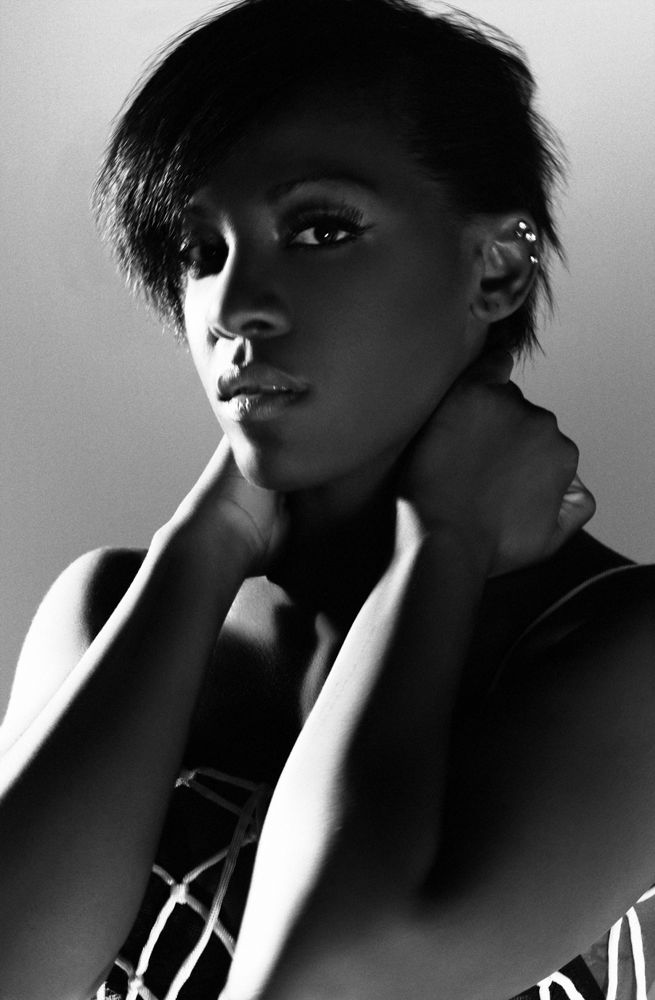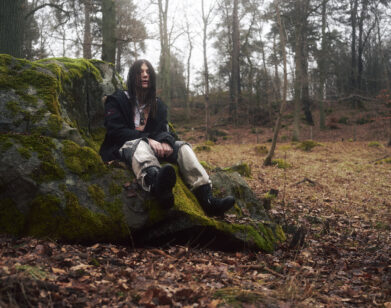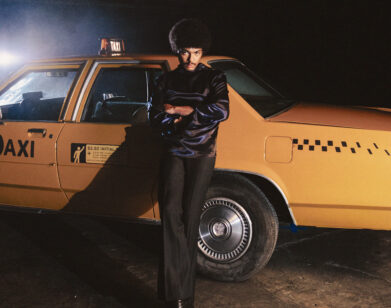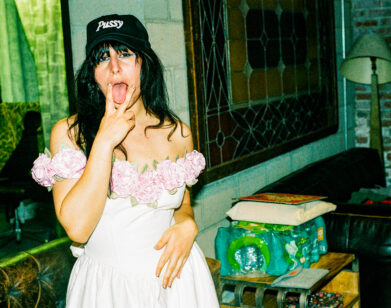Exclusive Song Premiere and Interview: ’86,’ Dawn Richard
Where have all the “independent women” gone? Look no further than singer-songwriter Dawn Richard, whom many may recall as a member of the short-lived ’00s pop group Danity Kane, and one-third of the even shorter-lived Diddy-Dirty Money.
But Richard’s no second fiddle—releasing a mixtape and EP on her own, without any major label assistance, to rave reviews and an inspired fanbase—yet it’s her upcoming debut solo effort, Goldenheart, that’s set to get the mainstream talking once it’s released next month. Blending alternative listens like Björk and Imogen Heap with 80s pop (à la Phil Collins and Prince), and putting it all atop tribal drums, Richard has crafted a atmospheric aesthetic unto her own that’s already garnered the attention of her peers, mentors, and critics. Referencing everything from medieval literature to Peter Gabriel, she’s a unique force willing to bring versatile urban music back to the forefront. It might seem like an uncertain moment for R&B—with its legends languishing and its future in limbo under the current dance-pop reign—but Richard, much like Frank Ocean, is ready to take the genre someplace unexpected. Her first single, the inspirational “’86,” is a full-package proclamation to which she demands the walls be broken down before the battle commences.
We spoke with the New Orleans-born rising star on the eve of her single release and are proud to debut “’86” below.

MARCUS HOLMLUND: You’ve been in the spotlight for six years now. Why do you think the two groups you were in, Danity Kane and Diddy-Dirty Money, folded?
DAWN RICHARD: I think they just ran their course. I think the big difference with Danity Kane was that we were manufactured. It wasn’t organic, like sisters coming together and forming a group. I mean, it was a reality show project [Making The Band] that created us—a competition. We were picked and at a time, we actually had a relationship, or rather, a bond that was tighter than sisters, but that was really just to survive and that’s hard to do when there’s cameras documenting your every move. So many people thought we were a joke because they watched us on the show. We had to make people believe we were great, and we were, but it was that much harder to prove ourselves because we were manufactured. We had success, but it ran its course for what it was…
HOLMLUND: What about Dirty Money?
RICHARD: I think we were ahead of our time. I hear a lot of groups and artists coming out now with similar sounds. I think people are just starting to love the sound now. When we came out, Puff tried his best to show the world something different, and I believe it may have been too much for people to digest and understand then. That’s the sad thing about this industry.
HOLMLUND: What’s the process like now that you’re working on your own and not in a group?
RICHARD: With everything I had done up to this point, it was always in a group. It always had so many hands in each project that it was easy to get lost in the mix. From the production to the lyrics to the message, it was always a whole crew of people working on it together. Now, being solo and independent, it’s all me. The difference now is really that no one’s telling me where my direction needs to go. I think with this album and the last EP, people see I’m not a puppet—that I can do my own thing and be honest and do it without a label and make music people really feel. I’m in that transition period where it’s risky, but, it’s also paying off: like P!nk, for example. She started with R&B on her first album, and then flipped it to what she’s doing now, on her second album. She’s doing better now than ever before because it’s genuine and people can hear that. She showed people she wasn’t just a label. That’s where I’m at right now. I think it’s important as an artist.
HOLMLUND: How has growing up in New Orleans influenced your upcoming debut’s sound?
RICHARD: It’s in the drums. There’s definitely that tribal Africana thing going on in my sound. It’s that marching band, second-line music, that Creole-influence in the kick, and the snare that drives everything for me. I think it’s really what’s separated my sound from a lot of the R&B and pop music out there. It’s what I grew up on.
HOLMLUND: However on your first single off Goldenheart, “’86,” it’s definitely not as tribal sounding… it’s almost like a Jimmy Jam and Terry Lewis song (like Janet Jackson’s “That’s the Way Love Goes”) or ’80s teen movie synth ballad. Sort of “Purple Rain,” even.
RICHARD: You’re right. I’m big on showing people versatility. I’m constantly trying to push myself to break barriers and the idea that we have to stay in one lane… New Orleans is just a piece of what my sound is. For “’86,” my producer Drew and I really went back to the basics. I also grew up listening to Prince, Genesis, Cyndi [Lauper], Peter Gabriel, and Phil Collins, which you hear a lot of in “’86.” Their sound resonated in my life and my childhood, so, it’s really in a sense the beginning of my story. And that’s exactly what “’86” and Goldenheart is for me. A new beginning. “’86” is really the most naked single I’ve ever had. I did that purposely because when you’re presenting a story, you don’t start at page 50, you start at page one. “’86” is about the lyrics and the atmosphere—it tells you how I gave it all up to start this new journey. “’86” is actually a slang term—it means to get rid of something. For me, I’ve put up so many walls that I forgot if I was going to do this, that I can’t play the victim, I have to play the survivor. The song’s about ridding yourself of all those barriers so that you can be free and fight for love. That’s what everything I do now is about. The fight for love—what I love, and that’s the music.
HOLMLUND: Is that the theme for this album? New beginnings? Because when I look at the tracklist, there’s so much that recalls medieval literature… and you’re right, the fight for love…
RICHARD: Goldenheart is like a modern-day Joan of Arc. Think of it like medieval times-cum-2045 or Lancelot and Guinevere in 3025. It’s a new version of these battles—age-old stories for the now. They’re stories that have always been relatable, and I like to make people dream and think and imagine and learn and study. Nowadays, music is so literal—it’s telling you, “This is how it is,” and my music’s the opposite. I come from an era where lyrics were full of imagery and metaphor, and that’s all I know. I think people miss that. I’m telling these age-old stories, just in a different way—my way.
HOLMLUND: I’m psyched to see a reference to Peter Gabriel on the Goldenheart tracklist. Did you cover “In Your Eyes”? That’s definitely a sound I know you mentioned growing up on…
RICHARD: No, no. [laughs] Are you kidding? Being an independent artist, me and Drew [my producer], would have been sued off our ass for that! It’s just inspired by. We took it to a whole different level. We took the essence of the song and made it our own. It’s not a love story, it’s more of a redemption record. I had always wanted to do my own [Bob] Marley “Redemption Song,” and this is that for me. It’s a celebration of life. It’s a hope record about possibilities. I connect so much with Peter Gabriel’s sound because, to me, he always had that South African vibe. His drums were always something to move to, it was almost like Calypso. I’m a big fan.
HOLMLUND: Would you say Gabriel’s your end-all, be-all musician, inspiration-wise?
RICHARD: No, I’d have to say Björk and Phil Collins are really the ones I’ve been most inspired by. I like to combine their influence with my urban background—because it is possible, and a lot of folks never thought it was. I think of it this way—when I’m above and looking down at the world, there is no color, there is no genre, it’s just see through. And that’s what I’m going for.
HOLMLUND: People love to compare your music to Brandy’s. How do you respond to the comparisons?
RICHARD: I always tell people that I’m honored to hear that, because she’s someone I embrace. What I think is so interesting about it is people are comparing me to a veteran in the game. I haven’t even been in the game 15 years. I’m only just now about to release my first solo album, so, I’m grateful that they’re saying that. I mean, I know it’s because we have a similar tone [to our voice], and we both share similar influences, like Imogen Heap. I feel it’s just very human for people to compare anybody to anybody. It’s very natural, but, at the same time, we are very different artists. People need to associate others with others to figure them out. I’m not mad at it—it’s just like Britney and Christina or Rita Ora and Rihanna. People have to find a way to make it make sense for themselves in order for them to love the music. By the time this album comes out, I think people will hear we’re totally different. I’ll let the music speak for itself.
“’86” WILL BE AVAILABLE TO DOWNLOAD ON ITUNES TOMORROW. GOLDENHEART IS OUT OCTOBER 16. FOR MORE ON DAWN RICHARD, VISIT HER TUMBLR.
Slideshow photo credits
Photography: Aaron Stern
Styling: Marcus Holmlund
Hair and Makeup: Lizzie Arneson







